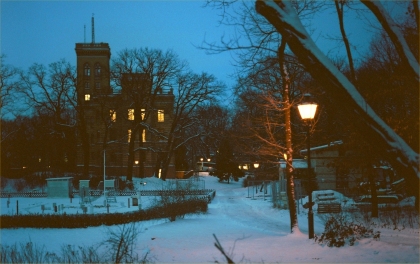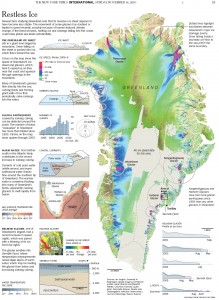It is a good tradition in science to gain insights and build intuition with the help of thought-experiments. Let’s perform a couple of thought-experiments that shed light on some basic properties of the statistics of record-breaking events, like unprecedented heat waves. I promise it won’t be complicated, but I can’t promise you won’t be surprised.
[Read more…] about On record-breaking extremes
The Moscow Warming Hole
This week, PNAS published our paper Increase of Extreme Events in a Warming World, which analyses how many new record events you expect to see in a time series with a trend. It does that with analytical solutions for linear trends and Monte Carlo simulations for nonlinear trends.
A key result is that the number of record-breaking events increases depending on the ratio of trend to variability. Large variability reduces the number of new records – which is why the satellite series of global mean temperature have fewer expected records than the surface data, despite showing practically the same global warming trend: they have more short-term variability.
Another application shown in our paper is to the series of July temperatures in Moscow. We conclude that the 2010 Moscow heat record is, with 80% probability, due to the long-term climatic warming trend. [Read more…] about The Moscow Warming Hole
Is Sea-Level Rise Accelerating?
A few months ago a paper by Jim Houston and Bob Dean in the Journal of Coastal Research (JCR) cast doubt on whether global sea level rise has accelerated over the past century or so. As things go these days, ‘climate sceptics’ websites immediately heralded this as a “bombshell”. A rebuttal by myself and Martin Vermeer has now been published in JCR.
[Read more…] about Is Sea-Level Rise Accelerating?
2000 Years of Sea Level (+updates)
A group of colleagues have succeeded in producing the first continuous proxy record of sea level for the past 2000 years. According to this reconstruction, 20th-Century sea-level rise on the U.S. Atlantic coast is faster than at any time in the past two millennia.
Good data on past sea levels is hard to come by. Reconstructing the huge rise at the end of the last glacial (120 meters) is not too bad, because a few meters uncertainty in sea level or a few centuries in dating don’t matter all that much. But to trace the subtle variations of the last millennia requires more precise methods.
[Read more…] about 2000 Years of Sea Level (+updates)
Nobel Laureates Speak Out
On Wednesday, 17 Nobel laureates who gathered in Stockholm have published a remarkable memorandum, asking for “fundamental transformation and innovation in all spheres and at all scales in order to stop and reverse global environmental change”. The Stockholm Memorandum concludes that we have entered a new geological era: the Anthropocene, where humanity has become the main driver of global change. The document states:
[Read more…] about Nobel Laureates Speak Out
Coldest Winter in 1000 Years Cometh. Not.
This claim circulates in the internet and in many mainstream media as well: Scientists have allegedly predicted the coldest winter in 1,000 years for Europe. What is behind it? Nothing – no scientist has predicted anything like it. A Polish tabloid made up the story. An interesting lesson about today´s media.
By Stefan Rahmstorf and Olivia Serdeczny
We had read about it a few times and last Wednesday even were asked by German TV about the allegedly coldest winter in 1000 years, predicted by (depending on the source) Polish or Russian climatologists or meteorologists. Reason enough for us to take a closer look at the story behind the story.
It did not take much googling to find the source: various articles on the internet name the Polish scientist Michał Kowalewski, sometimes in the Russian spelling version of Mikhail Kovalevski. A few clicks later we arrive at the original article with Kowalewski´s quotes. Except that Kowalewski does not predict a record winter there – the “millennium winter” merely appears in the headline. A closer reading of the article quickly reveals: the quotes were answers to questions concerning the role of the Gulf Stream for Europe´s climate. The frosty temperatures are hypothetical effects of a breakdown of the Gulf Stream – which, as Kowalewski points out, can be pretty much ruled out.
We asked Kowalewski for his comments on the media coverage and promptly got his answer in an email from Warsaw:
The reports in some media are absolutely unbelievable. A journalist who interviewed me for radio had asked me about the theoretical climatic effects of a breakdown of the Gulf Stream. I answered that this purely hypothetic scenario would lead to much colder winters in Poland. A few days later I found on the internet the article of a journalist who mixed his own words with some of my quotes without their context so well that a completely new meaning came out. An absolutely absurd thesis. My quotes as such are correct, so I was not able to demand a correction.

Winter has Europe in its grip: the Süring-building of the Potsdam Institute.
It’s an interesting and insightful tale how this story spread. Here is a brief chronology:
September, 10. Michał Kowalewski is interviewed by the Polish radio station tok.fm. The same day the website of a Polish tabloid, Gazeta.pl, publishes an article with the headline of a „millennium record winter“ („once-in-a-millennium winter“). A certain Gianluigi Zangari is being quoted at the outset. He has apparently claimed to have found a slow-down of the Gulf Stream in satellite data, which he attributes to the BP oil spill (we did not follow this bizarre claim to the source). Subsequently Kowalewski´s radio interview is brought in – in order to explain the Gulf Stream and its effects on climate in general.
September, 12. „Fakt“, a Polish tabloid, writes „Millennium Winter is Coming!“ Again the BP oil spill is blamed. This time, however, without any reference to Zangari, so readers could easily be left with the impression that this is Kowalewski´s idea.
September, 22. The Voice of Russia reports that the Polish scientist „Mikhail Kovalevski“ is worried about the Gulf Stream breaking down, which Russian scientists counter as being an exaggeration.
Oktober, 4. The Russian RT News Service predicts „The coldest winter in 1.000 years“. Which is explained by the Gulf Stream having slowed down by half. RT refers to Polish scientists: “Polish scientists say that it means the stream will not be able to compensate for the cold from the Arctic winds. According to them, when the stream is completely stopped, a new Ice Age will begin in Europe”. This is where the Russian Vadim Zavotschenkow enters the scene. However, he mentions merely a cold winter: “Although the forecast for the next month is only 70 percent accurate, I find the cold winter scenario quite likely”.
Oktober, 4. The “climate sceptics” website wattsupwiththat, noted for their false reports, takes up the RT piece, presents it together with The Voice of Russia and mentions „Mikhail Kovalevski“. Watts seems to be the bridge for the story´s crossing into the western media. Is it just coincidence that the „record cold winter“ story nicely suits the political agenda of the climate sceptics?
From then on, the story is repeated on many other European media, including serious newspapers and television.
It is staggering how one journalist just copied another, sometimes even embellishing the story, without ever bothering to check the source or ask Kowalewski himself. It took us less than ten minutes of googling to get serious doubts about whether this story was real. The familiar pattern of „Chinese whispers“ emerges here once again – the same that widely spread the false whatevergate-stories.
But the often self-righteous free western press can actually learn a lesson from its Chinese counterpart in this case. The Chinese news agency Xinhua checked the story and issued the following on October, 20.:
A forecast attributed to Polish scientists of the coldest European winter in 1,000 years has drawn plenty of media attention recently but investigations by Xinhua reporters have cast doubts on its veracity.
p.s. There are, by the way, scientifically well-founded attempts to explain the currently cold weather in Europe. The basic check for seriousness: a peer-reviewed journal source is provided, and according to Google Scholar the author has a decent publication record. A millennium-record-winter, however, is not being predicted there.
p.p.s. Should your newspaper have also reported this turkey, feel free to write a polite letter to the to editors asking for a correction. It is only if readers demand published information to be verified (or if needed corrected) that something will change to the better.
This article is adapted from the German original at KlimaLounge.

Olivia Serdeczny is a scientist with the Potsdam Institute for Climate Impact Research in Germany.
Sea level rise: The New York Times got the story
Yesterday, the New York Times ran an excellent cover story on sea level rise, together with two full pages inside the paper, fancy graphs and great photographs (online version here). The author, Justin Gillis, researched the piece for months, visited Greenland and talked to most of the leading scientists in the field – many of which he cites in the article. The science presented is correct and up-to-date and the story is a gripping read. That’s how science journalism should be!
 What is going on in Greenland? (c) The New York Times.
What is going on in Greenland? (c) The New York Times.[Read more…] about Sea level rise: The New York Times got the story
Happy 35th birthday, global warming!
Global warming is turning 35! Not only has the current spate of global warming been going on for about 35 years now, but also the term “global warming” will have its 35th anniversary next week. On 8 August 1975, Wally Broecker published his paper “Are we on the brink of a pronounced global warming?” in the journal Science. That appears to be the first use of the term “global warming” in the scientific literature (at least it’s the first of over 10,000 papers for this search term according to the ISI database of journal articles).
In this paper, Broecker correctly predicted “that the present cooling trend will, within a decade or so, give way to a pronounced warming induced by carbon dioxide”, and that “by early in the next century [carbon dioxide] will have driven the mean planetary temperature beyond the limits experienced during the last 1000 years”. He predicted an overall 20th Century global warming of 0.8ºC due to CO2 and worried about the consequences for agriculture and sea level.
[Read more…] about Happy 35th birthday, global warming!
Solar
 The new novel Solar by Ian McEwan, Britain’s “national author” (as many call him) tackles the issue of climate change. I should perhaps start my review with a disclosure: I’m a long-standing fan of McEwan and have read all of his novels, and I am also mentioned in the acknowledgements of Solar. I met McEwan in Potsdam and we had some correspondence while he wrote his novel. Our recent book The Climate Crisis quotes a page of McEwan as its Epilogue. And of course I’m not a literature critic but a scientist. So don’t expect a detached professional review. [Read more…] about Solar
The new novel Solar by Ian McEwan, Britain’s “national author” (as many call him) tackles the issue of climate change. I should perhaps start my review with a disclosure: I’m a long-standing fan of McEwan and have read all of his novels, and I am also mentioned in the acknowledgements of Solar. I met McEwan in Potsdam and we had some correspondence while he wrote his novel. Our recent book The Climate Crisis quotes a page of McEwan as its Epilogue. And of course I’m not a literature critic but a scientist. So don’t expect a detached professional review. [Read more…] about Solar
Climate scientist bashing
A new popular sport in some media these days is “climate scientist bashing”. Instead of dealing soberly with the climate problem they prefer to attack climate scientists, i.e. the bearers of bad news. The German magazine DER SPIEGEL has played this game last week under the suggestive heading “Die Wolkenschieber” – which literally translated can mean both “the cloud movers” and “the cloud traffickers” (available in English here ). The article continues on this level, alleging “sloppy work, falsifications and exaggerations”. By doing so DER SPIEGEL digs deeply into the old relic box of “climate skeptics” and freely helps itself on their websites instead of critically researching the issues at hand.
[Read more…] about Climate scientist bashing